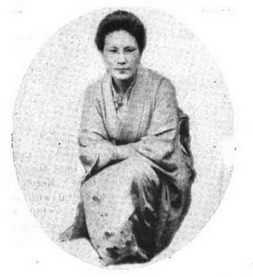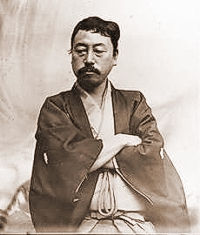 W
WMasaharu Anesaki , also known under his pen name "Chōfū Anesaki" , was a leading Japanese intellectual and scholar of the Meiji period. Anesaki is credited as being the father of religious studies in Japan, but also wrote on a variety of subjects including culture, literature, and politics. He was also a member of the International Committee on Intellectual Cooperation of the League of Nations.
 W
WKoizumi Yakumo , born Patrick Lafcadio Hearn, was a Japanese writer of Greek-Irish descent. He is best remembered for his books about Japanese culture, especially his collections of legends and ghost stories, such as Kwaidan: Stories and Studies of Strange Things. In the United States, he is also known for his writings about New Orleans, based on his decade-long stay there.
 W
WJoseph Heco was the first Japanese person to be naturalized as a United States citizen and the first to publish a Japanese language newspaper.
 W
WInagaki Manjirō was a Japanese diplomat and political theorist who was active during the Meiji period of Japan.
 W
WSir Kazuo Ishiguro is a British novelist, screenwriter and short-story writer. He was born in Nagasaki, Japan, and moved to England in 1960 when he was five.
 W
WKawai Michi was a Japanese educator, Christian activist, and proponent of Japanese-Western ties before, during, and after World War II. She served as the first Japanese National Secretary of the YWCA of Japan and founded Keisen University.
 W
WKatué Kitasono was a renowned Japanese poet and photographer. He was born in the city of Ise, Mie Prefecture, Japan.
 W
WJunzaburō Nishiwaki was a contemporary Japanese poet and literary critic, active in Shōwa period Japan, specializing in modernism, Dadaism and surrealism. He was also a noted painter of watercolors.
 W
WNitobe Inazō was a Japanese agricultural economist, author, educator, diplomat, politician, and Christian during the pre-World War II period.
 W
WYonejirō Noguchi was an influential Japanese writer of poetry, fiction, essays and literary criticism in both English and Japanese. He is known in the west as Yone Noguchi. He was the father of noted sculptor Isamu Noguchi.
 W
WOkakura Kakuzō was a Japanese scholar who contributed to the development of arts in Japan. Outside Japan, he is chiefly remembered today as the author of The Book of Tea.
 W
WYukio Ozaki was a Japanese politician of liberal signature, born in modern-day Sagamihara, Kanagawa. Ozaki served in the House of Representatives of the Japanese Diet for 63 years (1890–1953). He is still revered in Japan as the "God of constitutional politics" and the "father of the Japanese Constitution".
 W
WViscount Suematsu Kenchō was a Japanese politician, intellectual and author, who lived in the Meiji and Taishō periods. Apart from his activity in the Japanese government, he also wrote several important works on Japan in English. He was portrayed in a negative manner in Ryōtarō Shiba's novel Saka no ue no kumo.
 W
WDaisetsu Teitaro Suzuki was a Japanese author of books and essays on Buddhism, Zen (Chan) and Shin that were instrumental in spreading interest in both Zen and Shin to the West. Suzuki was also a prolific translator of Chinese, Japanese, and Sanskrit literature. Suzuki spent several lengthy stretches teaching or lecturing at Western universities, and devoted many years to a professorship at Ōtani University, a Japanese Buddhist school.
 W
WShunryu Suzuki was a Sōtō Zen monk and teacher who helped popularize Zen Buddhism in the United States, and is renowned for founding the first Zen Buddhist monastery outside Asia. Suzuki founded San Francisco Zen Center which, along with its affiliate temples, comprises one of the most influential Zen organizations in the United States. A book of his teachings, Zen Mind, Beginner's Mind, is one of the most popular books on Zen and Buddhism in the West.